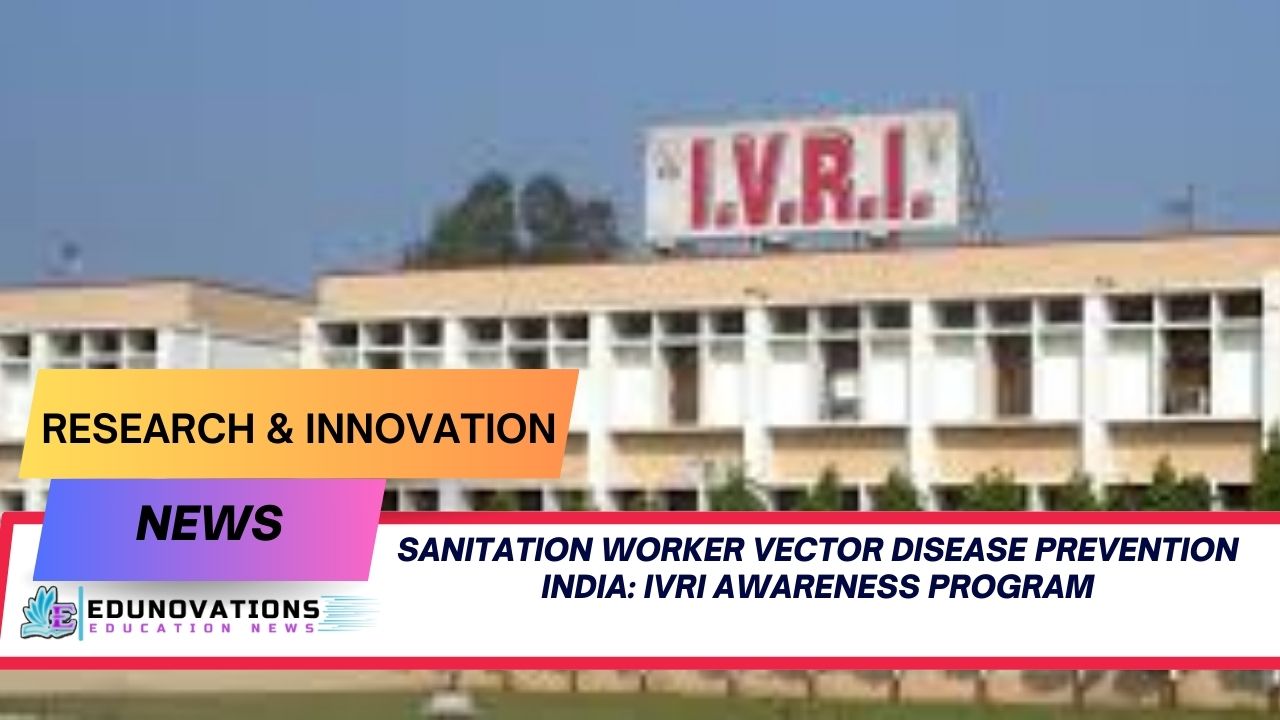IVRI conducts a Sanitation Worker Vector Disease Prevention India program, educating SC workers on dengue, Japanese encephalitis, and hygiene practices to strengthen public health.
The Indian Veterinary Research Institute (IVRI), Izatnagar, recently hosted a landmark awareness program on August 21, 2025, under the Scheduled Caste Sub Plan Scheme, engaging 50 beneficiaries. This initiative aimed at sanitation worker vector disease prevention in India, addressing the heightened risk of vector-borne zoonotic diseases faced by sanitation workers due to occupational exposure.
Sanitation workers play an indispensable role in maintaining public health, yet they remain particularly vulnerable to infections transmitted by mosquitoes, ticks, and fleas. Recognizing this, the IVRI Division of Veterinary Public Health (VPH) collaborated with experts including Dr. Bablu Kumar, Head of VPH, and Dr. Himani Dhanze, Scientist, to ensure the program delivered practical and preventive knowledge.
Toppers Use Mind Maps to score more than 95%
NCERT Class 11th Commerce Mind Maps
Add to cartOriginal price was: ₹999.00.₹199.00Current price is: ₹199.00.NCERT Class 12th Chemistry Mind Maps
Add to cartOriginal price was: ₹199.00.₹75.00Current price is: ₹75.00.NCERT Class 12th Commerce Mind Maps
Add to cartOriginal price was: ₹999.00.₹199.00Current price is: ₹199.00.NCERT Class 12th Science Mind Maps
Add to cartOriginal price was: ₹999.00.₹199.00Current price is: ₹199.00.NCERT Mind Maps For Class 10th
Add to cartOriginal price was: ₹999.00.₹199.00Current price is: ₹199.00.
Purchase Today
Objectives of the Awareness Program
The program focused on:
- Educating sanitation workers about vector-borne diseases and zoonotic pathogens.
- Highlighting monsoon mosquito-borne diseases awareness programs, particularly dengue and Japanese encephalitis.
- Providing guidance on antimicrobial resistance and foodborne pathogen prevention.
- Promoting practical measures to improve workplace and household hygiene.
Interactive Sessions: Expert Insights
During the session, Dr. Himani Dhanze explained the nature of zoonotic diseases and the role of vectors in disease transmission. She emphasized:
- The critical role of sanitation worker vector disease prevention India initiatives.
- Preventive strategies to combat mosquito-borne infections, including proper waste disposal, use of protective equipment, and environmental hygiene.
- The seasonal surge in diseases during monsoon months, when stagnant water encourages mosquito breeding.
Participants were educated on diseases such as:
- Dengue fever
- Japanese encephalitis
- Chikungunya and other mosquito-borne infections
The session included demonstrations on proper hand hygiene and mosquito control methods to reduce exposure risks.
Special Focus on Vulnerable Communities
Dr. Bablu Kumar highlighted the urgent need to protect high-risk communities like sanitation workers. He emphasized that workplace safety is intrinsically linked to broader public health outcomes. The initiative aligns with national health objectives to reduce incidences of vector-borne diseases through targeted education programs.
Distribution of Preventive Resources
To reinforce learning, each participant received:
- A foldable king-size mosquito net for household and workplace protection.
- Leaflets covering:
- Antimicrobial resistance awareness
- Dengue fever prevention tips
- Best practices for vector-borne disease prevention
- Hand hygiene techniques
These resources serve as ongoing reminders to implement preventive measures, empowering sanitation workers to safeguard themselves and the communities they serve.
Community Impact and Feedback
The program was highly appreciated by participants, who recognized the value of practical knowledge and safety resources. Participants reported feeling better equipped to implement preventive measures at work and home, thereby contributing to monsoon mosquito-borne diseases awareness program efforts at the community level.
Key outcomes included:
- Increased understanding of vector-borne and zoonotic disease risks
- Adoption of preventive hygiene practices
- Enhanced awareness of antimicrobial resistance
Integrating Public Health Education
Experts recommend that similar initiatives be implemented across the country to protect vulnerable populations. Effective public health strategies for sanitation workers can reduce the spread of diseases, improve workforce productivity, and strengthen national health security.
By focusing on targeted education, India can address vector-borne health risks efficiently. According to studies, vector-borne diseases account for a significant percentage of infectious diseases in urban and rural settings, making sanitation worker vector disease prevention India initiatives vital.
Expert Recommendations
Dr. Himani Dhanze advised:
- Continuous monitoring of mosquito breeding sites, especially during monsoon.
- Routine health check-ups for sanitation workers.
- Adoption of personal protective equipment (PPE) in workplaces.
- Awareness campaigns to educate families and communities about dengue prevention training for sanitation workers.
Additionally, experts suggest linking these programs with online educational resources such as NCERT Courses, Current Affairs, Notes, and MCQs to reinforce knowledge retention.
Long-Term Public Health Benefits
Programs like these provide multiple benefits:
- Reducing disease incidence in vulnerable communities
- Encouraging behavioral changes in sanitation and hygiene
- Strengthening community resilience against outbreaks
- Promoting awareness of antimicrobial resistance education for sanitation staff
By integrating educational campaigns with practical tools, authorities can ensure sustained impact on scheduled caste health awareness sanitation workers initiatives.
Role of Technology in Disease Prevention
Modern public health strategies can further enhance outcomes:
- Mobile health applications for disease reporting
- Digital awareness campaigns on social media
- Collaboration with educational platforms like NCERT Videos and NCERT Mind Maps for structured learning
External partnerships with trusted organizations such as Mart India Infotech can facilitate the distribution of digital resources and provide a platform for real-time health alerts.
Moving Forward: Strategic Recommendations
To strengthen sanitation worker vector disease prevention India initiatives, experts suggest:
- Expanding coverage to include rural and semi-urban sanitation workers.
- Conducting seasonal workshops before monsoon onset.
- Creating community-based surveillance teams to identify early signs of outbreaks.
- Integrating dengue prevention training for sanitation workers with broader public health programs.
The IVRI program serves as a model for other states aiming to improve workplace safety while advancing public health education.
Conclusion
The IVRI awareness program successfully addressed the critical need for sanitation worker vector disease prevention India. By combining expert knowledge, interactive sessions, and practical preventive tools, the program empowered sanitation workers to take charge of their health. Initiatives like these exemplify the importance of proactive public health interventions, particularly for high-risk populations during the monsoon season.
This program not only improved individual well-being but also contributed to broader community health, reducing the burden of vector-borne and zoonotic diseases in the region.
FAQs
- What is sanitation worker vector disease prevention India program?
A program by IVRI aimed at educating sanitation workers about vector-borne and zoonotic disease prevention. - Which diseases were highlighted during the awareness program?
Dengue, Japanese encephalitis, chikungunya, and other mosquito-borne infections. - Who participated in the program?
50 beneficiaries, primarily Scheduled Caste sanitation workers. - What resources were provided to participants?
Foldable mosquito nets and leaflets on dengue, vector-borne diseases, and antimicrobial resistance. - Why is monsoon awareness important for sanitation workers?
Monsoon creates breeding grounds for mosquitoes, increasing the risk of vector-borne diseases. - What role do sanitation workers play in public health?
They help maintain community hygiene, reducing the spread of infections and vector-borne diseases. - How can sanitation workers prevent dengue and mosquito-borne diseases?
By using mosquito nets, practicing proper hand hygiene, and eliminating stagnant water. - What is the significance of antimicrobial resistance education for sanitation staff?
It prevents misuse of antibiotics and reduces the risk of drug-resistant infections. - How can communities support sanitation worker health initiatives?
By participating in awareness programs and adopting safe hygiene practices at home. - Where can I find related educational resources for sanitation health programs?
Platforms like NCERT Courses and NCERT Videos provide additional learning materials.














